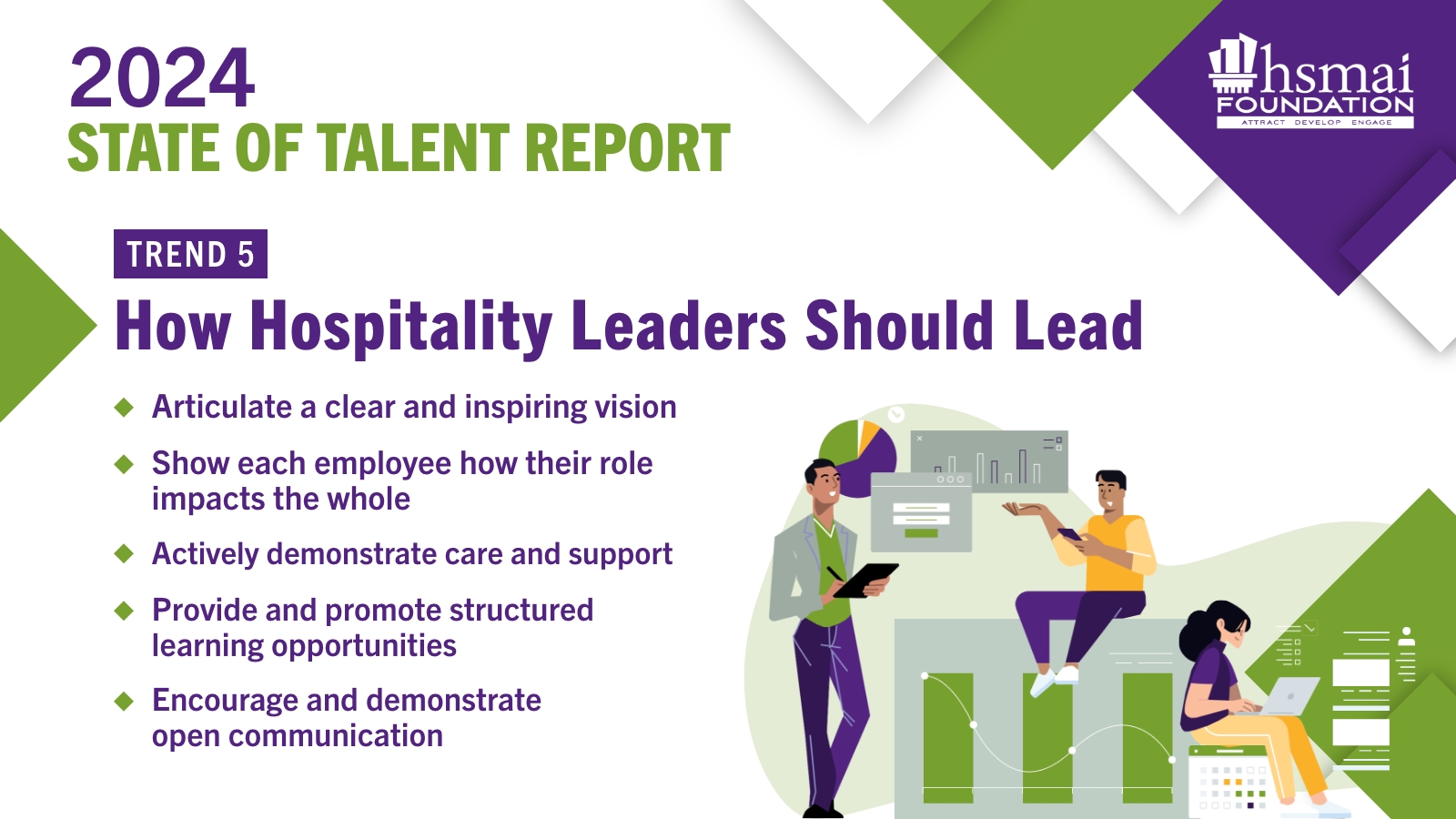Throughout numerous HSMAI meetings, including board meetings, commercial week, and leadership conferences, a consistent and powerful theme has emerged regarding the role of leadership in the post-pandemic era. It has become evident that effective leadership is paramount in defining an organization’s culture, fostering a sense of community, and serving as a shining example of collaborative teamwork. The insights presented in this excerpt from the HSMAI Foundation Special Report: The State of Hotel Sales, Marketing, and Revenue Optimization Talent 2023-2024 are attributed to HSMAI board members and leaders from these meetings.
Here are the five key leadership themes that have consistently resonated within the HSMAI community:
- Visionary Leadership: Leadership sets the tone by articulating a clear and inspiring vision that defines the organization’s purpose and values. This visionary perspective acts as a guiding beacon, ensuring that every team member aligns with the organization’s mission and goals. Much like a “wolf pack” analogy, senior leadership within the company and the GM on property are the key drivers of this vision. General Managers are encouraged to build a strong community on property, fostering unity and camaraderie among the team. Above-property teams are urged to form a supportive “wolf pack” behind the GM to amplify their efforts and ensure success.
- Culture Cultivation with a Revenue Focus: Leadership plays a pivotal role in establishing the organizational culture by embodying the desired behaviors and attitudes that drive revenue and profitability. When leaders prioritize guest satisfaction and a commitment to excellence, they create an environment where employees not only understand but actively contribute to the business’s financial success. One critical element identified by HSMAI leadership is the importance of connecting the dots for teammates, helping them see how their roles are integral to the organization’s overarching goals. Leaders must break down these goals and cascade them throughout the organization, reducing the “they said” mentality from team members and helping them understand the personal significance of these goals.
- Team Well-being: Leadership sets the tone by placing a high value on the well-being of employees. Through active demonstrations of care and support for their teams, leaders send a powerful message that team care is not just a slogan but a foundational pillar of the organization’s culture. As the saying goes, “frustration hijacks culture every day.” Leaders need to identify and address sources of frustration at work, as these can negatively impact the culture. Removing obstacles and providing support are crucial steps in promoting team well-being.
- Continuous Learning and Growth: Leadership underscores the significance of continuous learning and development by allocating resources and fostering a culture that values skill enhancement. Leaders proactively promote structured learning opportunities, igniting motivation within employees to engage in personal and professional growth. As stated in a Fast Company article, “Leaders see a window of opportunity to upskill their workforces to work with the latest technologies.” Addressing knowledge gaps, particularly in areas like sales, is a critical concern. Additionally, leaders should focus on automating routine tasks to free up employees for more meaningful work. While fears of automation persist, it’s important to acknowledge that AI will create new and more engaging roles in the future.
- Collaborative Synergy: Leadership promotes collaboration by encouraging open communication and establishing clear expectations for teamwork. Leaders actively endorse a culture of collaboration that transcends boundaries, emphasizing that unity between above-property and on-property teams is indispensable for achieving success. Challenges between hotel brands and management companies, as well as asset managers, are creating hardships for owners. Ownership groups are growing resentful of the demands placed by hotel brands, making it essential for brands to leverage the expertise of management companies and asset managers to ensure a more collaborative environment that drives commercial success. Many of the management companies active with HSMAI routinely hold quarterly in-person meetings between above property and property teams across all shared services roles inclusive of finance, asset management, revenue management, and sales and marketing as a standard practice to encourage collaboration between all practice areas to ensure effective collaboration.
In summary, these five leadership themes consistently echoed within the HSMAI community underscore the pivotal role of leadership in shaping organizational culture, fostering a sense of community, and exemplifying the essence of collaborative teamwork. As the hospitality industry evolves post-pandemic, these leadership principles serve as guiding principles for success.
Key Takeaways
- Leaders define and model culture.
- Driving results means leaders need to connect the dots for teammates to allow them to contribute effectively.
- Employee well-being and team care are foundational pillars in successful hospitality businesses. • Upskilling investments to leverage new technologies is needed to automate routine tasks and free up employees for meaningful work.
- Teamwork and collaboration are keys to success.
To read more about the top talent trends download the HSMAI Foundation Special Report: The State of Hotel Sales, Marketing, and Revenue Optimization Talent 2023-2024.
